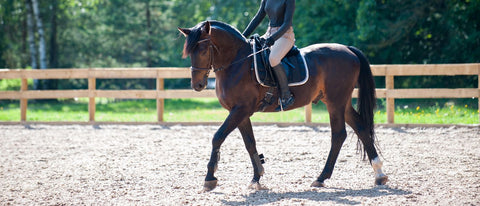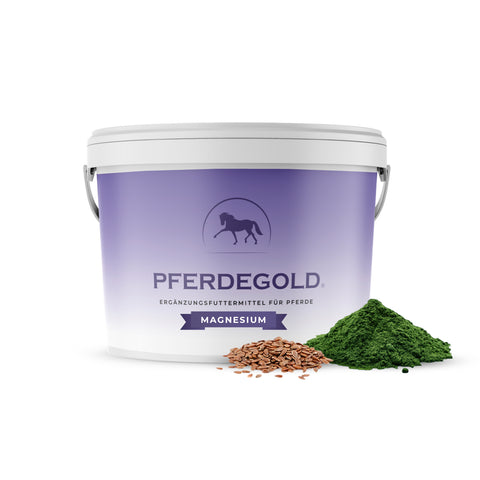
Florian ist aufgewachsen auf einem Bauernhof. Umgeben von Pferden, entdeckte er früh seine Faszination für diese majestätischen Tiere. Inspiriert von seiner reitbegeisterten Mutter, entwickelte er das Nahrungsergänzungmittel - Pferdegold. Seine tiefe Verbundenheit zur Natur und die leidenschaftliche Hingabe zu Pferden trieben ihn an, sein Unternehmen zu gründen.
Magnesium in horses: The underestimated mineral for nerves, muscles and performance
Is your horse nervous, tense, or experiencing muscle cramps ? A magnesium deficiency could be the cause! Magnesium is one of the most important minerals for horses, yet it's often overlooked . In this article, you'll learn everything about magnesium's functions, how to recognize a deficiency, and how to optimally nourish your horse.

Relaxed horse in the pasture: Magnesium for calm and serenity
What is magnesium and why is it so important?
Magnesium is an essential mineral that the horse's body cannot produce itself. Over 300 enzymes depend on magnesium, making it one of the most important minerals of all .
🧠 The most important functions of magnesium:
Nervous system and behavior:
Magnesium acts as a natural "relaxant" in the nervous system. It regulates the transmission of stimuli between nerve cells and promotes calm and serenity . Without sufficient magnesium, horses quickly become nervous, jumpy, or overreact to environmental stimuli.
Muscle function:
Every muscle contraction requires magnesium. It ensures that the muscles can relax after contraction. Magnesium deficiency leads to tension, cramps, and muscle tremors —especially after exercise.
Energy metabolism:
Magnesium is key to energy production in cells. It activates ATP (adenosine triphosphate) production – the body's universal energy carrier. Without magnesium, there's no energy!
Bones and teeth:
About 70% of the body's magnesium is stored in bones and teeth. It works closely with calcium to ensure stable bone structures.
Magnesium deficiency in horses
Causes and risk factors "Magnesium deficiency" is widespread.
Up to 80% of horses are not optimally supplied with magnesium . The causes are varied and often interrelated.
The main causes of magnesium deficiency are related to feeding and soil quality .
Magnesium-poor soils produce magnesium-poor hay and grass. Furthermore, artificial fertilizers displace magnesium from the soil.
High potassium and calcium levels in the feed inhibit magnesium absorption, as does poor feed quality or one-sided feeding.
Stress and strain also play a major role, including physical stress from intensive training or competitive sports.
But also mental stress due to changes in posture, transport or restlessness and also hormonal changes in pregnant or lactating mares.
💡 Did you know?
Magnesium is excreted in greater quantities during stress! Stressed or high-performance horses therefore have a significantly higher magnesium requirement than leisure horses kept calm.
Detecting magnesium deficiency: correctly interpreting warning signs
These symptoms are warning signs. The signs of magnesium deficiency are diverse and often overlooked or misinterpreted. Early detection is crucial, as symptoms worsen with persistent deficiency.
🚨 Typical signs:
Behavior and nervous system:
- Excessive nervousness and nervousness
- Hyperactivity or constant restlessness
- Difficulty concentrating during training
- Hypersensitivity to noise or touch
Muscular system:
- Muscle tremors, especially after work
- Cramped or tense muscles
- Clumsiness in movement
- Delayed regeneration after training
Perfomance:
- Performance loss without any identifiable cause
- Rapid fatigue during normal work
- Impaired rideability or disobedience
Physical symptoms:
- Cardiac arrhythmias (rare, but possible)
-
Digestive problems or diarrhea
-
Brittle hooves or poor hoof quality

Nervousness in horses - a common sign of magnesium deficiency
Diagnosing magnesium deficiency
A blood test at the veterinarian can provide information about magnesium status. However, the blood test only shows the acute supply, not the long-term storage situation.
A more meaningful combination of clinical symptoms (see above), feeding analysis of the current ration and test supplementation and observation of improvement
Horses' magnesium needs: How much is necessary?
Nutritional requirements vary depending on the horse's size, weight, performance, and living conditions . Adequate nutrition is the foundation for health and well-being.
📏 Daily requirement according to horse size:
Maintenance requirements (preservation):
- Small horse (300kg) : 9-12g magnesium daily
- Large horse (500kg) : 15-20g magnesium daily
-
Cold-blooded horses (700kg) 21-28g magnesium daily
Increased demand for:
- Sport horses: +20-40% more
- Pregnant mares : 15-25% more
- Lactating mares: +30-45% more
- Young, growing horses: +25-35% more
- stressed or sick horses: individually adapted
Guidelines for practice:
- Leisure horse (500kg): 15-18g magnesium/day
-
Sport horse (500kg): 20-25g magnesium/day
- High performance horse (500kg): 25-30g magnesium/day

Magnesium usually has to be added as the supply from the basic feed is usually not sufficient
Magnesium sources: Natural supply vs. targeted nutrition
Magnesium is primarily supplied through basic feed (hay, grass) and concentrated feed. However, in many cases, this is not enough to fully meet the animal's needs.
🌱 Natural sources of magnesium:
Forage:
- High-quality hay: 1-3g magnesium/kg (varies greatly)
- Fresh grass: 1.5-4g magnesium/kg (seasonal)
-
Alfalfa/Sainfoin: higher levels than grass
Concentrated feed:
-
- Oats: 1-2g magnesium/kg
- Barley: 1-1.5g magnesium/kg
- Wheat bran: 4-6g magnesium/kg
The problem: Magnesium levels in feed fluctuate greatly depending on soil quality, fertilization, and harvest time. Meeting the animal's needs through forage alone is often impossible.
💊 Targeted magnesium supplementation:
If the basic feed is insufficient, targeted supplementation is necessary. Different magnesium compounds are distinguished:
Magnesium oxide:
- High magnesium content (60%)
- not recommended as a sole source of magnesium, but ideal as a supplement to organic forms of magnesium
Magnesium fumarate:
- Very good bioavailability
- Magnesium content approx. 18%
Magnesium Glycinate:
- Best recording and utilization
- Magnesium content approx. 14%
💡 Pro tip: Why combine different magnesium sources?
The Combination of several magnesium compounds is particularly effective because they use different absorption pathways in the intestine. While magnesium oxide provides a high amount, magnesium fumarate and magnesium glycinate provide a optimal bioavailability . This ensures uniform and complete supply guaranteed throughout the day.

High-quality magnesium should consist of various magnesium sources
The optimal supply of Pferdegold Magnesium:
✅ High-quality magnesium compound
Optimal bioavailability for best absorption and utilization
✅ Dosage as needed
Precisely tailored to the daily magnesium requirements of horses
✅ Monopreparation without additives
Concentration on the most important mineral - without unnecessary fillers
✅ Made in Germany
Highest quality standards and strict controls
✅ Grain-free & doping-free
Safe for all horses, including sport and competition horses
✅ 30-day money-back guarantee
Test risk-free and convince yourself of the effect
⚠️ Important note: Pferdegold Magnesium is not related to the symptoms or illnesses described in this article. It does not treat any illnesses and is not a substitute for veterinary diagnosis or treatment. This supplement can only be used as preventative support in healthy horses.

Pferdegold® Magnesium
This specially developed supplement provides triple the magnesium power and a fast and long-lasting magnesium supply. Made in Germany, grain-free, and with a 30-day money-back guarantee.
Order nowApplication and dosage
The recommended daily dose is one scoop per day for a small horse and two scoops per day for a large horse (over 600 kg). For increased needs, consult your veterinarian.
🌱 Feeding recommendation:
Mix over the concentrate or give directly into the mouth
- Divided into 2 doses for better tolerability
- Continuous administration for lasting effect
⚖️ Dosage guidelines :
Gradual dosage:
- Week 1: Start with half dose
- Week 2: Increase to target dose
- From week 3: Give full dose continuously
🐴 Continuous administration vs. treatment :
- Continuous administration: In case of chronic deficiency or increased need
- Treatment: 4-6 weeks for acute problems, then a break
- Need-based administration: In stressful times (tournament, transport)
⚠️ Important information on dosage
Avoid overdose: Eating more than the recommended daily amount can lead to diarrhea.
Note interactions: High calcium or phosphorus intake reduces magnesium absorption
Individual customization: If unsure, consult a veterinarian or feeding advisor

Horses that are sufficiently supplied with magnesium are usually much more balanced
Frequently asked questions about magnesium in horses
How quickly does a magnesium supplement work?
The first improvements are usually visible after 2-3 weeks . A full effect is achieved after 4-6 weeks of continuous administration, as the body's reserves must first be replenished.
Can you overdose on magnesium?
Yes, an overdose is possible. More than 40-50g of pure magnesium can lead to diarrhea and digestive problems. However, at normal dosages, magnesium is very safe.
When is the best time to take magnesium?
It is ideal to add it to the concentrate feed , as other nutrients improve the absorption The dose can also be divided between morning and evening . For nervous horses, an evening dose can help relax them .
Is magnesium relevant for doping?
No, magnesium is a natural mineral and not relevant for doping. It can be used safely in sport and competition horses.
Conclusion: Magnesium - The key to relaxed and high-performing horses Magnesium is much more than just a "sedative"
It is an essential building block for health, well-being, and performance. An optimal magnesium supply supports the nervous system, muscle function, and overall energy metabolism.
The most important findings:
- Magnesium deficiency is widespread and often overlooked. The symptoms are diverse and range from nervousness to muscle tension and loss of performance
- Natural sources are often not sufficient, because the magnesium content in forage varies greatly and many soils are low in magnesium
- Targeted supplementation with high-quality preparations such as Pferdegold® Magnesium can close the supply gap and significantly improve well-being
- The correct dosage is crucial - neither under- nor overdose leads to the desired result
Perfect for your horse: Pferdegold® supplementary feed!
These specially developed supplements support your horse's diet and provide it with natural nutrients. Made in Germany, grain-free and drug-free, they come with a 30-day money-back guarantee.
IMPORTANT:
Pferdegold is not a substitute for veterinary diagnosis or treatment. The information contained in this article is for general informational purposes only and is intended to help improve your horse's well-being.
Pferdegold Magnesium is not related to the disease described in this article. It does not treat any disease and is not a substitute for veterinary diagnosis or treatment. This supplement can only be used as preventative support for healthy horses.
















